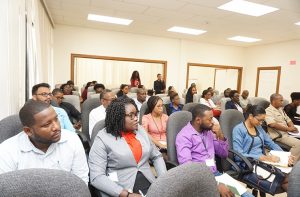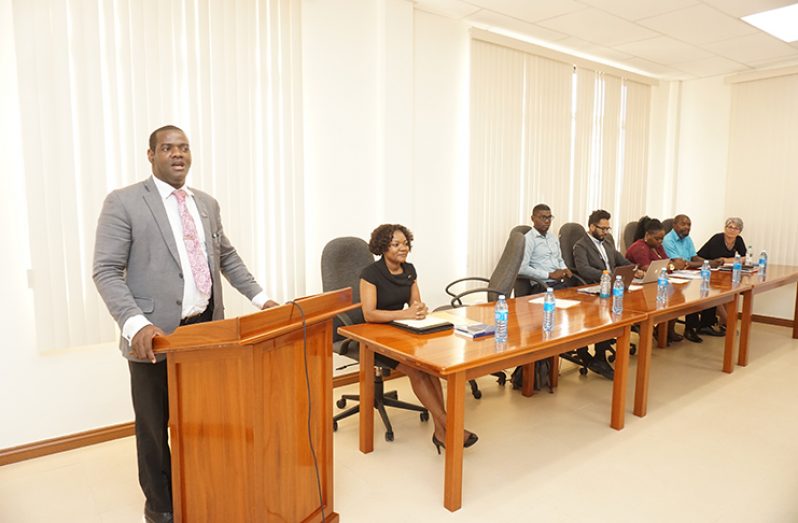STAKEHOLDERS in Guyana are learning about the conservation and sustainable use of marine biological diversity existing beyond the country’s national jurisdiction, with the aim of contributing to the development of legally-binding instrument to be adopted by the United Nations (UN).
A national stakeholder workshop in this regard was held on Thursday by the Ministry of Foreign Affairs which was well-attended by invited participants. Members of the UN are currently negotiating an international legally-binding instrument under the United Nations Convention on the Law of the Sea (UNCLOS) on the conservation of marine Biodiversity of areas Beyond National Jurisdiction (the BBNJ Agreement)
It was explained that this deals with the conservation and sustainable use of biodiversity in international waters. International waters are often referred to as ‘the high seas’ meaning the open ocean which is not within any country’s jurisdiction. It includes focus on Marine Genetic Resources (MGRs); Environment Impact Assessments (EIAs); Areas Based Management Tools (ABMT) including Marine Protected Areas (MPAs) and Capacity Building and Transfer of Marine Technology (CBTT).
An Intergovernmental Conference on marine BBNJ is scheduled for March 23-April 3, 2020 at the UN Headquarters where it is expected that these issues will be explored and treaty subsequently adopted.
Such a treaty should fill the gap in existing international ocean laws and regulate activities in international waters. The Ministry explained that it is critical that Caribbean Community (CARICOM) stakeholders in particular have their priorities and perspectives addressed in the negotiation of this treaty.

As such, Guyana’s stakeholder involvement on the country level will later be merged with other countries of CARICOM to form a CARICOM negotiating team. The workshop is also an effort of the ministry to sensitise local stakeholders on the role of Guyana as Chair of the G77 and China as it negotiates on behalf of the 135 Member States the development of the legally binding instrument on conservation and sustainable use of marine biological diversity of areas beyond national jurisdiction.
In remarks to the gathering, Director of the Department of Multilateral and Global Affairs, Troy Torrington said that the stakeholder consultation was especially important as it will help Guyana in its fight against climate change even as the country seeks to meet its individual and international obligations.
“By having areas beyond national jurisdiction adequately managed, it places us in an advantageous position to be able to respond to several of the global challenges we now face,” he said. “It is a continuing interface with stakeholders so that Guyana can indeed have its best contribution to the process.”
The Ministry has several experts on its team which will be working to sensitise stakeholders
and spark discussions on key areas relating to MGRs, EIAs, ABMT, MPAs and CBTT.
These include: Fisheries Officer at the Ministry of Agriculture Fisheries Department, Randy Bumbury; Legal Officer at Environmental Protection Agency (EPA), Saeed Hamid; Deputy Commissioner at the Protected Areas Commission (PAC), Odacy Davis and BBNJ Advisor, Dr. Patrick Chesney.
They each presented an overview of their objectives at the session while there were several small workgroups throughout the day. At the end, the participants were expected to become aware of the BBNJ process and issues and how these are relevant to their rights, responsibilities and interests; give feedback on their perspective and priorities to support CARICOM negotiators and build ownership of the BBNJ process for implementation of the agreement produced.



.jpg)








